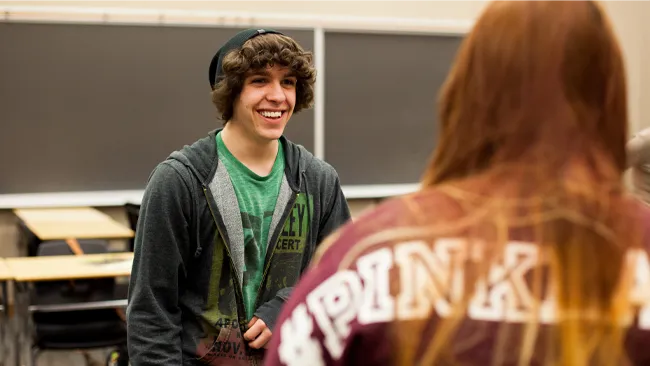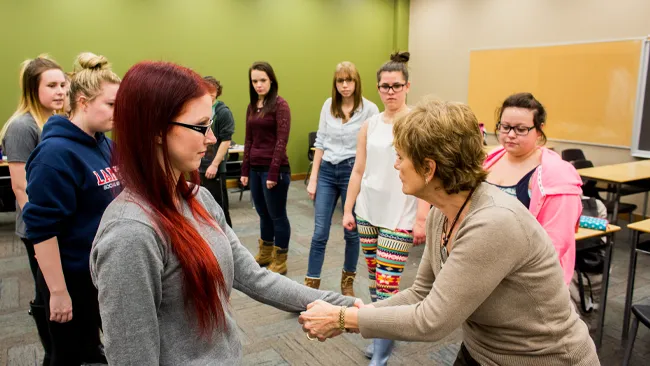

Social Service Worker
Overview
Being an effective Social Service Worker requires a strong understanding of self, empathy, effective listening skills, and a love of people, to help individuals, families, and communities reach their full potential.
Students in Lambton College's Social Service Worker program will develop the skills, knowledge, and values required to support diverse individuals, families, groups and communities. With practical experience both in and out of the classroom, as well as through ongoing reflective practice, students will develop the skills to assist in empowering clients to learn to help themselves and to face the challenging work of being a Social Service Worker.
Face-to-face classes on campus, technology in the classroom, role play and simulation exercises as well as a variety of personal, hands-on experiences, will result in a deeper understanding of self, which will ultimately benefit clients.
Individuals considering the Social Service Worker program are asked to carefully evaluate their reasons for entering this field. The work calls for people who are mature enough to examine their own values, beliefs and life experiences, while focusing upon the needs of vulnerable populations.
Program Highlights
Admission Requirements
O.S.S.D. or equivalent with:
- Grade 12 English C or U
Mature Student Assessment for this program is available in the subject of English for the purpose of demonstrating proficiency in this required admission subject. For all other admission requirements, applicants must complete the required course(s) as listed above. For more information, please contact counselling@lambtoncollege.ca. Review the Mature Student Admission process.
Academic admission requirements can be obtained through Academic Upgrading and the Pre-Programs at Lambton College.
Hear from our Past Graduates
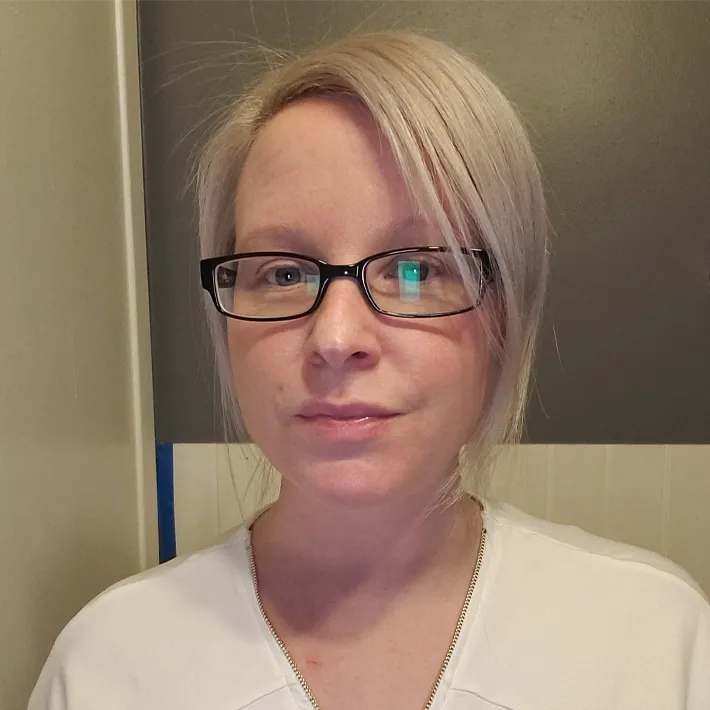
Victoria Thomson
"The professors put a lot of time, effort and passion into teaching. The learning content is critical to not only succeed in the course but to also become the best version of yourself. This program has prepared me to go into all situations with an empathetic lens which is critical to helping others."
~ Working with Senior Transitions Made Simple providing social work in long-term care homes
Lucas Roe
"In completing the SSW program and working in the field after graduating, I feel strongly that the hands-on learning and incredible opportunities provided to develop, expand, and enhance skills through assignments, practicum, and connections with the teachers were vital to the success of my education and career.
I have never felt so welcomed and supported that I have at Lambton College in this program."
~ Social Service Worker, Children's Aid Society of London & Middlesex

Costs
- Year 1 $4,156.71
- Year 2 $4,066.68
Please Note: These fees apply to the 2025-2026 academic year and are subject to change. Fees do not include books (unless specifically noted), supplies or living costs.
Scholarships Available
There are 14 scholarships available for this program, with a total value of $4,150!
Technology Requirements
In order to keep pace with the requirements of each and every course in your program, Lambton College requires that each student have access to a laptop while studying at our college.
Courses
Critical Thinking & Writing
This writing course challenges students to explore diverse opinions and articulate their own perspectives clearly and persuasively. Through critical reading, students will develop skills in synthesis, analysis, comparison, and response, striving for clarity and diplomatic expression of their opinions based on factual evidence. Students will practice various rhetorical strategies of persuasion and hone their writing to ensure precision and accuracy in their messages. This course lays the foundation for a subsequent research-writing course, equipping students with essential skills for academic success.
Helping Skills
This is an introductory course to enable students to focus on an awareness of themselves as helpers. The helping process, interpersonal communication skills and casework principles are explored, resulting in the student understanding how their values and personal styles are related to effective case work and the casework relationship.
Social Service Systems I
This course traces the historical development of social work in Canada. The student explores the various delivery systems that the social service worker uses to enable their clients to help themselves. The systems are examined in terms of level of government role, funding, function, organizational structure and administration. Pertinent government legislation and analysis of oppressed population groups assist the student's understanding of the system. Students explore the roots of poverty and the impact on individuals, families and communities locally, provincially and nationally. Emphasis of study also includes examining social service work with women and Indigenous peoples in Canada.
Field Work Preparation
This course develops the student's knowledge of persistent and emergent social problems and issues in the community. A life skills model is introduced as a tool for students to apply in group and individual settings in teaching problem solving skills. This course introduces the student to the social work network of resources and provides them with what they need to know to prepare for their first field placement experience in Semester II. The students are also introduced to the Ontario College of Social Work and Social Service Work Code of Ethics.
Introduction to Community Mental Health
Effective practitioners begin their work with an understanding of how individuals think, feel, and behave. Included in this knowledge must be the contextual factors that impact wellness, including the following: personal challenges, relationships, environmental stressors, and diversity needs. The goal of this course is to provide future front-line workers with practical examples of how a mental health concern might develop and how they might respond. Examination of the biological and sociocultural determinants of addictions and mental illness, treatment options, and community resources that can be leveraged to enhance wellbeing are the key components of this course. Students will not only apply theory and diagnostic criteria to a presenting problem, but they will also become responsive to the grey areas that are unique to a person's situation.
General Education Elective
Communications for Community Services
This course enhances students' research and communication skills in preparation for work in community services. Through the theme of "advocacy and education," students gather, analyze, and respond to recent and relevant research in their field, creating research reports and research presentations to share with their peers. The research process provides students with the opportunity to develop their writing skills through critical thinking, analysis, synthesis, application, and evaluation. These skills are necessary for success in current and future college courses, the workplace, and students' personal lives.
Interview & Assessment Skills
This course provides students with interviewing and basic assessment skills. The primary focus is on adapting these skills to various practice settings. Role-plays and simulations provide an opportunity for students to begin practicing and demonstrating their skills.
Social Service Systems II
This course builds on SSW 1023 by continuing to explore oppression and privilege in social service work practice. Examinations of current social and economic systems that can be oppressive and unjust to particular populations in Canada are explored in depth. Emphasis of study includes persons with physical disabilities, youth, sexual and gender diversity, immigration and cultural diversity, child welfare and child abuse and the elderly. Students review and analyze key government legislations that support and impact these population sub groups.
Ethics & Report Writing
This course's seminar approach is designed to help the student integrate theory from the profession with their practicum experience. Students are expected to design a Field Placement Learning Goals and Objectives document that will reflect their learning needs in conjunction with their field placement. Students are encouraged to share their practicum experiences with their peers in small group sessions. Students will also learn and abide by the Ontario College of Social Work and Social Service Work Code of Ethics. Writing skills will also be developed relevant to the Social Service Work profession.
Social Group Work
This course is designed and based upon the "Experiential Learning Model". The course is meant to be a practical, hands-on-learning environment that moves students from theory to practical experiences. By establishing student groups (teams) in a structured setting, interpersonal skills and group dynamics can be explained, understood, and practiced.
Field Work I
Students, in conjunction with Faculty, will apply for field placement opportunities and interview with agency or school staff, who ultimately make the final decision in accepting a student. Students will spend 2 days a week in placement for 12 weeks in the semester and complete 2 full block weeks of placement. Students will be responsible for working with individuals, families and groups, as per the agency/school mandate. They will also be responsible for administrative duties as required. This work will be completed under close supervision of a Field Supervisor. Field work will provide significant practice learning where the theory learned in the classroom comes together with practice in the field.
Social Justice Advocacy
Social justice advocacy focuses on unmet needs in our society and the effective ways social service workers can make change. By considering the efforts of groups already active in social justice advocacy, this course introduces students to reviewing public awareness campaigns, voting initiatives, lobbying elected officials, direct action (through petitions, boycotts and protests) and public interest litigation as tools for change. After identifying their specific cause, each student will prepare a social justice advocacy plan utilizing their advocacy tools in a multifaceted approach to change.
Psychology II
This course introduces students to key areas of psychology related to lifespan development, personality, motivation and emotion, social influence, as well as psychological disorders and treatments. Students will gain a broad understanding of how these factors influence human behaviour and mental processes. Students are required to purchase the assigned textbook to be successful in the course.
Case Work Relationships
This is an advanced-level course in interviewing and it thoroughly examines the legal duties and ethical responsibilities of an SSW. Particular emphasis focuses on the students' development of interviewing skills that will transfer across many populations and social service organizations. Interviewing skills are taught from anti-oppressive practice theory, with a focus on understanding the impact of trauma. Students practice advanced skills in exploring, contracting, and influencing the client in a constructive manner.
Professional Integrity
This course explores the importance of professional integrity in the field of social service work. Anti-oppressive practice theory as well as a holistic, integrated, principle centred approach to professional practice, will be used to explore self awareness when it comes to demonstrating professional integrity in the field placement experience. Using reflective practice, students will explore their use of front line practice skills while working with clients. Small group lab classes will be used for students to discuss how they are integrating their classroom, skills based learning, into their work in their field placement. During this time they will identify successes in the field as well as areas for growth.
Field Work II
Students, in conjunction with Faculty, will apply for field placement opportunities and interview with agency or school staff, who ultimately make the final decision in accepting a student. Students will spend 2 days a week in placement for 9 weeks in the semester and complete 1 block week of placement. Students will be responsible for working with individuals, families and groups, as per the agency/school mandate. They will also be responsible for administrative duties as required. This work will be completed under close supervision of a Field Supervisor. Field work will provide significant practice learning where the theory learned in the classroom comes together with practice in the field.
Family Process
This course introduces the student to the developmental stages that a family experiences during its lifetime. A systemic approach is used as a framework to explore the stages of the family, paying respect to the diverse experiences of various family forms.
General Education Elective
Community Organization
This course is an introduction to community organization and social policy. Engaging in community practice enables the Social Service Worker to make client referrals, assess community resources, develop client social support systems and advocate to policy makers for programs to meet clients' needs. Students in this course engage in a community project in Sarnia/Lambton that strives to meet this ideal, based on a social problem/need identified by the student group.
Community Participation
This course encourages students to participate actively in their community through volunteer work. Students will engage in networking and advocacy activities to promote positive change and social justice. Students will have the opportunity to integrate theory and skills in their work with individuals, families, groups and community agencies.
Case Management
This course is designed to develop the students' understanding of the purpose and use of the casework problem-solving method. Students examine and explore their abilities in the following areas: basic and advanced communication skills, establishing working relationships with clients, helping clients challenge themselves, problem clarification, goal setting, development of an action plan, the implementation of the plan and on-going evaluation. The course provides the student with a practical, planned and organized framework for understanding client problems and developing purposeful methods with the client for creative problem solving.
Overview of Addictions
This course provides an overview of addictions. Students examine a variety of factors that influence the addictive cycle and the associated addictive behaviours. We explore the impact addictions have on an individual, the family and society. Students gain knowledge and have the opportunity to apply a variety of therapeutic interventions to work with the addicted individual..
Social Issues & Problems
This course is designed to cover a variety of current social issues and problems in our society. This seminar approach allows students to continue their discussions of relevant placement issues.
Field Work III
Students will continue at the field placement site that they were selected for in SSWF 3084. Students will spend 2 days a week in placement for 14 weeks in the semester and complete 1 full block week of placement. Students will continue to be responsible for working with individuals, families and groups, as per the agency/school mandate. They will also be responsible for administrative duties as required. This work will continue to be completed under close supervision of a Field Supervisor. This Field work will provide significant practice learning where the theory learned in the classroom comes together with practice in the field.
Contact
School of Fire Science, Health & Community Services
Program Information
After Graduation
Employment Opportunities
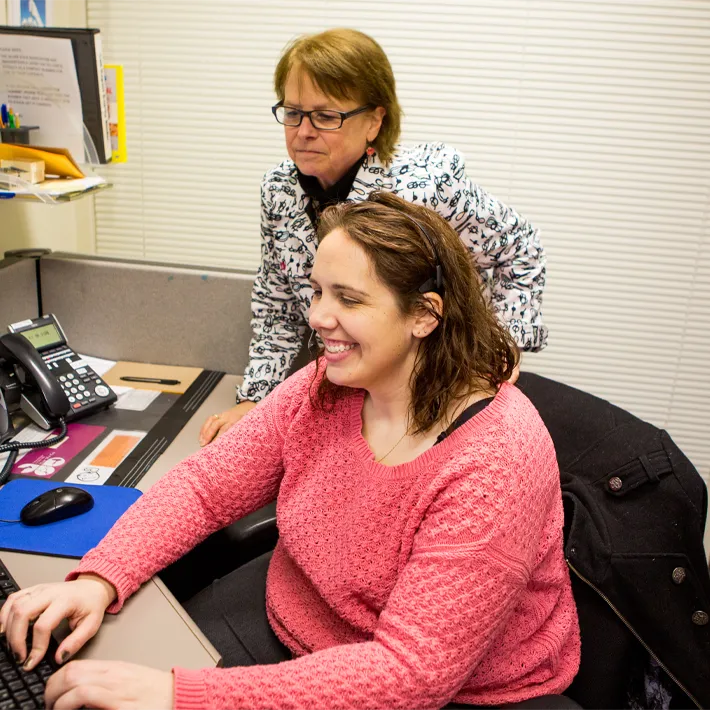
Graduates of the Social Service Worker program are successful in finding employment working with a variety of populations and in a number of different social service and government organizations. These opportunities include employment at Lambton County Social Services (Ontario Works), associations for the developmentally disabled, homeless shelters, poverty reduction and food stability organizations, women’s shelters, sexual assault centres, long-term care homes and senior's facilities, job training/employment services, school boards, distress line call responders, hospice and services supporting children and youth.
Accreditations & Certifications
Certificates & Training
Students in this program will obtain the following certifications as part of the program curriculum:
- SafeTALK Suicide Prevention Certification - equips students to recognize the warning signs that someone may be at risk of suicide and provides guidance about what to do.
- Non-Violent Crisis Intervention Training - the industry minimum standard to work in the Social Service Worker field
Ontario College of Social Workers & Social Service Workers
Upon successful completion of the Social Service Worker program, students are eligible to apply to become a registered Social Service Worker. Registration with the Ontario College of Social Workers & Social Service Workers is required to use the title of Social Service Worker.
Pathways
Build on your education and complete a college diploma or university degree in Ontario, Canada, or abroad
Want to see more Ontario transfers? Visit ONTransfer.ca.
Placement
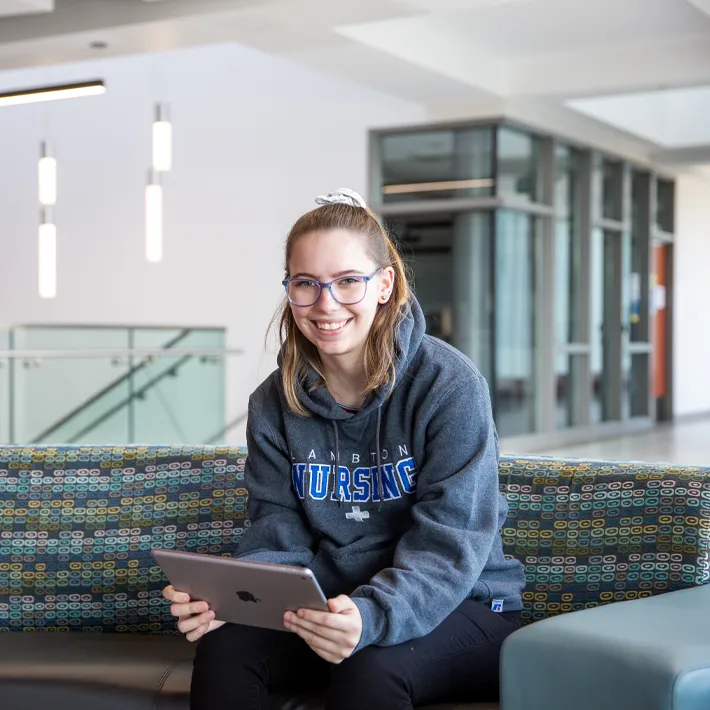
Vaccinations & Police Record Checks
Students considering this program should be aware that there are field placement requirements. All placements require students to have police record checks. Proof of immunizations is also required and must be cleared through Passport to Placement.
Once you’ve applied, you can log in to mylambton.ca and view the program-specific Field & Clinical Placement Requirements. If you need information about these requirements before applying, please contact placementinfo@lambtoncollege.ca.
Schedules
Students in this program participate in two placements with two different organizations or employers.
The first takes place in Term 2, and the second happens throughout the second year of the program.
Obtaining a Placement
Students considering this program are required to have a vulnerable sector criminal reference check. Records that are not clear may result in an inability to obtain a placement. Some placement sites do require proof of vaccination.
Building Strong Partnerships that Strengthen Communities
Placements in our Community
Over the years, Lambton College has developed a strong relationship with the Big Brothers Big Sisters of Sarnia-Lambton. This partnership creates a number of placement opportunities for Lambton College students and it allows the community to access a number of programs that wouldn't exist without this collaboration.
- 15 - 20 students placed in field placements or internships each year
- Representing the Child & Youth Care, Social Service Worker, and Office Administration programs
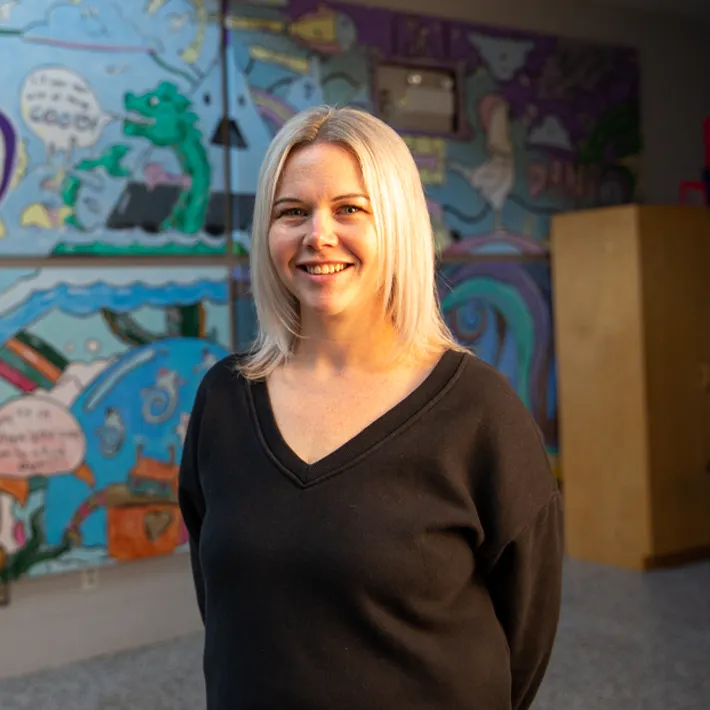
More Information
Technology Requirements
It is recommended that you use a Windows laptop for your coursework. While other devices like MacBooks or Chromebooks might work for some tasks, they may not support all the software required for your program. If you're unsure, check with your professors before buying.
Internet Speed Requirements
To get the best experience while learning online, we recommend having an internet connection with at least 40 Mbps download speed and 10 Mbps upload speed. This will help you use video calls, attend online lectures, and access other learning tools smoothly.
Because students live in many different areas, we can't suggest a specific internet provider. You'll need to check with local companies to find one that works best for you.
Laptop Requirements
In order to access the internet and virtually-delivered software and courseware, student laptops should include the following at a minimum. By meeting the following specifications, students will be equipped to access software and courseware on their laptop through the internet:
- Intel i5 8th Gen Processor or equivalent
- 8GB of RAM
- 100 GB HDD or more
- Webcam with a microphone
- Wi-Fi capable (802.11n/ac 5GHz)
- Windows 11 operating system
Mobile Device
Students will require a mobile device (smartphone) for:
- Accessing your digital student ID
- Using campus applications and services
Software
To ensure students are getting the most our of their classroom experience, some software will be required.
Lambton College has made this software easily accessible online. Students can leverage our Microsoft Office 365 software packages and services. In addition, much of the software you require for your courses will be available on demand for use on any device - on or off campus.
